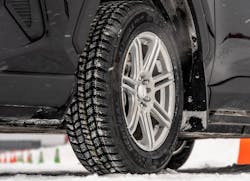Continental Tire the Americas LLC sees a bright future for the all-weather segment. The company introduced its first all-weather tire - a General brand product - earlier this year.
The General AltiMAX 365AW is available in 52 sizes, ranging from 15 inches to 20 inches in rim diameter. The tire has earned 3-Peak Mountain Snowflake certification.
This enables the tire to deliver what Continental officials call “best-in-class, overall performance and optimal traction in deep snow, compared to typical all-season tires.”
Continental had been eyeing the all-weather segment for several years prior to launching the General AltiMAX 365AW, according to Joe Maher, product manager, passenger and winter tires.
While watching competitors roll out all-weather products, the company monitored feedback from its dealers.
“What we noticed is that in certain areas of the country, there is demand for a tire that is 3-Peak Mountain Snowflake-certified. And our dealers in those areas said they wanted an all-weather product in the value segment.
“We’re not a company that just throws stuff against the wall to see what sticks,” says Maher. “We work with our dealers. We involve them in what we do. They’re on the front lines. And we sort of let them tell us when the market gets to a critical mass.”
Once Continental decided to invest in all-weather, “we put together a project to understand what technologies were needed to build a tire that (satisfied) 3-Peak Mountain Snowflake (requirements) and also delivered other aspects of performance that consumers would be interested in.”
Maher notes that Continental’s dedicated winter tires “passed the 3-Peak Mountain Snowflake test with flying colors. There was a lot of investigation into what it would take to pass the (same) test in a robust manner” when developing a tire for the all-weather segment.
The big difference
It’s difficult to pinpoint the precise size of the all-weather segment, says Maher, “because different people have different views. But an all-weather tire doesn’t give the consumer extra value if that customer lives in a place where it doesn’t snow.”
However, both consumers and tire dealers in areas that see snow are warming up to the all-weather concept as distinctions between all-weather tires, all-season tires and dedicated winter tires become more defined and understood, he reports.
“We did some surveys with our dealers several years ago when all-weather tires first came out and it was really surprising.
“One of the questions I asked was, ‘Do you think the performance of an all-weather tire is similar to the performance of a winter tire?’ And our dealers said, ‘Yes.’ They thought it would be like a winter tire” due to the 3-Peak Mountain Snowflake designation.
Fast forward to last year, when Maher conducted some training sessions on winter tires.
“I asked a similar question and more than half said that all-weather tires are clearly not winter tires, but there is a market for a tire that is good in the winter and has enhanced snow traction versus a standard all-season tire.”
3-Peak Mountain Snowflake certification is the key differentiator between all-season tires and all-weather tires, says Maher.
“There is no realistic requirement to be all-season. You can have an all-season tire that would virtually be a summer tire and you can have an all-season tire that would be closer to a winter tire.
“The reason I think all-weather has benefits is that it really sets a minimum standard for snow capability.”
The 3-Peak Mountain Snowflake designation also “makes it easy for the dealer to point to a tire and say, ‘This is better in winter conditions than a tire without 3-Peak Mountain Snowflake because it has passed the minimum (winter performance) standard.’
“The designation allows dealers to make a good, qualified recommendation to the consumer.”
Why General?
When asked why Continental chose to enter the all-weather segment with a General brand tire instead of a product bearing its flagship name, Maher pointed to General’s positioning.
“The General brand is a strong tier-two brand,” he says. “With General, we’ve taken the strategy of building a really good tire with really strong performance and we want customers to come back and buy that tire again.
“We’re on the upper end of the performance level of two-tier and offer a really good proposition for both the dealer and consumers. I think that’s where we’ve found a solid niche” for General.
“So our new all-weather tire fits right into that proposition.”




